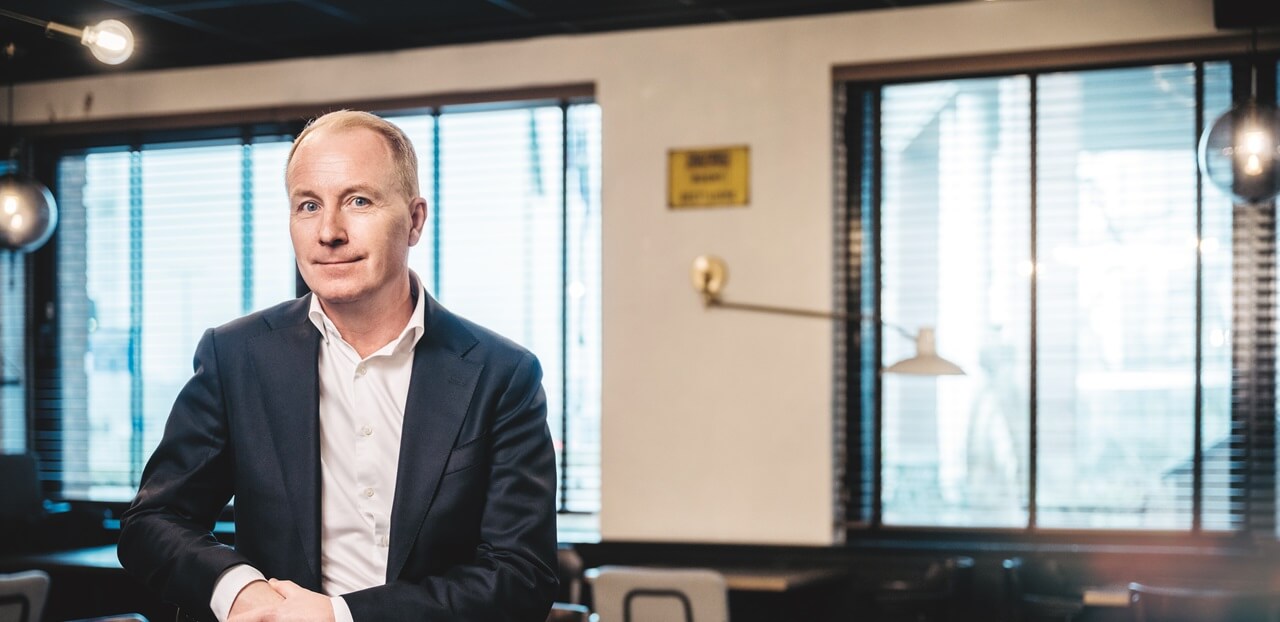Peter Agnefjäll (Ahold Delhaize): ‘We need to navigate between interests’

04-02-2025 | Interviewer: Charles Honée | Author: Emely Nobis | Image: Gregor Servais
The interview with the Swedish Peter Agnefjäll, who has been chairman of the supervisory board of Royal Ahold Delhaize since 2021, is conducted in English. However, he has been living in the Netherlands for nearly ten years, ever since he became CEO of IKEA in 2013, whose headquarters are in the Netherlands. ‘My relative lack of knowledge of Dutch is due to the Dutch people,’ he says with a laugh. ‘Everyone speaks good English, even the bus driver and the plumber. That really is a strength of this country.’
He notes that the transition from the Swedish furniture giant to the supermarket group, where he became a supervisory board member in 2019, was not a culture shock. ‘Both are large, international companies in the retail and consumer goods sector. They both have their headquarters in the Netherlands, making them subject to Dutch governance codes and legislation. Both companies also have international executive and supervisory boards. The similarities are much greater than the differences. Moreover, Swedes and Dutch people are quite similar in terms of mentality and values. And neither of our countries are global superpowers. We are rather dependent on international trade and the environment in which we operate.’
Sustainability has risen to the top of the governance agenda over the past decade, partly due to the 2015 Paris Climate Agreement. What will be the impact of Trump's re-election and the economic challenges facing many countries on the ESG landscape? Will the influence of the anti-ESG movement increase?
‘The approach to sustainability is one of the greatest challenges of our time. Looking back on my years here, and even before that at IKEA, things have certainly changed. There is more pushback against ESG topics than there was a few years ago. In a way, it can be healthy to examine the issue from all perspectives. There is always a movement from left to right and then back from right to left. If the pendulum swings too far in one direction, people sometimes tend to rush that way over-energetically, which can lead to a counterreaction.
I firmly believe that everyone wants a healthy planet. The debate is about how we achieve that. Is the European approach to this issue better than that of other countries? Time will tell. I remain optimistic, even if we are currently experiencing some setbacks.’
Is that pushback also increasing among shareholders? Are they focusing more on financial performance than on companies' sustainability performance?
‘Some investors are stepping back, which I personally find unfortunate, while others are stepping forward. Overall, I do not see any major shifts, and the pendulum swings less dramatically here than in politics or society. However, sometimes you can have two very different conversations with representatives from the same investor, depending on their role and area of focus within that company.’
It happens that large companies such as Unilever, which initially led the ESG agenda, now take a step back and adjust their goals and ambitions. How does Ahold Delhaize avoid such a shift in course?
‘It is a balancing act. My approach is to occasionally look back and reflect on whether Ahold Delhaize has struck the right balance between being a company solid in the present while also making the necessary investments to future-proof the business. That involves questions like: Are the stores inviting? Are the employees motivated? Have they invested sufficiently in technology, AI, and sustainability? Are they doing enough for the communities around our stores, for instance, when an area is hit by a natural disaster? There is constant friction between various interests, so finding that balance requires continual work. Regarding the specific example of Unilever, I cannot comment, but in general: sometimes companies invest too much in short-term results and too little in the future, or vice versa. If the balance is not right, pushback can follow.’
Shortly after your appointment as chairman of the supervisory board at Ahold Delhaize, you said in an interview with Management Scope that, as chair, you do not have to limit yourself to your formal responsibilities – you can and should take initiative. How has that played out?
‘Taking initiative is a form of influence that many people underestimate. You do not have to wait for something to be offered to you. One example is the decision to reappoint Frans Muller as CEO for a second term in 2022. That is one of the most important decisions a supervisory board can make. In the lead-up to that decision, we – myself, my supervisory board colleagues, the nomination committee, and the executive board – held discussions about what we wanted to achieve in the next term.
Those conversations helped trigger the management team to work on our new strategy, Growing Together, which was launched last year. Accelerating growth is a central element of that strategy, something I see as crucial for a company that has been around for more than a century. I do not want to overestimate my contribution to the process, but neither should we underestimate our role. This is a small example of how, as a supervisory board member, you can influence outcomes by fostering interaction.’
You previously mentioned the importance of a good balance between diverse interests. Does the stakeholder model, which we in the Netherlands are so proud of, provide the equipment to maintain the right balance when the company is under pressure from one of its stakeholders?
‘It certainly helps when navigating between those interests. At the end of the day, when making a decision, you have to take various interests into account. This applies in the Netherlands and also aligns with practices in many other countries. This is particularly important for a consumer-focused company like Ahold Delhaize. The company has around 7,700 stores in Europe, the United States, and Indonesia. These stores are at the heart of their communities, be it a store in Amsterdam or in Charlotte, North Carolina, and are exposed to everything happening in their environment.
We can never ignore what our customers think of us or they will shop elsewhere. At the same time, you cannot focus solely on the customer. If you neglect to take good care of your employees, this will have an impact on their interactions with the customers. As a customer-focused company, you must take care of your stakeholders to allow you to be successful. Everything is interconnected, and I believe shareholders are well aware of this.’
Like many other large companies, Ahold Delhaize is also confronted with activism, both from NGOs and from activist shareholders who aim to increase the value of their investment. This puts significant pressure on the board. How do you handle this as chairman of the supervisory board?
‘When I was first approached for this position, one of the pieces of advice I received was to spend enough time with the CEO. Frans and I have a scheduled meeting every week, and we also speak regularly outside of that when something arises. We also, as full supervisory board and executive board, spend considerable time together. This builds trust and ensures we are aligned when we face pressure.
A second reflection is that I believe in having a dialogue – not only with people who share my views but also with those who have totally opposing views. The world is not a place where everyone agrees. It is the task of both the supervisory board and the executive board to find a balance in all those opinions and interests and ensure we make decisions that satisfy all parties to some extent. At the same time, no one can get exactly what they want – that is inherently impossible.
Ahold Delhaize also faces activism focused on sustainability and climate issues. I am very sympathetic to this and we listen keenly to what is being said as this is a topic that is important to Ahold Delhaize, as shown by the company’s concrete goals in this area. However, we also deal with other groups pushing in the opposite direction. We want to listen to those concerns and criticisms as well.
I keep coming back to the importance of finding the right balance – in this case, between what we believe is right from a business, future, and values perspective, and the risks a company faces if it does not also consider the other side. I believe that, this far, Ahold Delhaize has managed to successfully maintain that balance.’
One can listen to others' opinions, but is the room to subsequently make changes not then limited?
‘If you engage in respectful conversations with stakeholders and genuinely try to understand what they are saying, you can learn from that. From time to time, this leads to internal discussions about whether certain things should be reassessed, for example, when the company is making a new investment decision.
You do not run a company on your own. If there is one thing we would like to see, it is more dialogue and collaboration and less time spent opposing one another. The more the company interacts with its stakeholders, the higher the quality of the decisions it makes towards the future.’
There is a renewed discussion about the business climate. What is your opinion?
‘A beneficial business climate and a level playing field are very important. Anything governments can do to stimulate this is good for companies – and therefore for people. One measure could be reducing administrative burdens and regulations. This is also a theme in Mario Draghi's report on the future of European competitiveness, alongside investments in innovation and technology. I sincerely hope that exploring opportunities for deregulation will become a mantra for the European Union in the coming decade.
And above these are the national regulations which does nothing to contribute to simplifying things. Deregulation is one of the levers that policymakers can use to promote a better business climate.
I would also prefer to see more collaboration and coordination, not only within the EU but also between the EU, the United States, and the United Kingdom. When the business climate improves, companies can grow, and growth means more resources are available to invest in society and citizens. Right now, growth in Europe is lower than in other parts of the world, which can lead to people worrying about their own prosperity and that of their children. This, in turn, can contribute to populism.
I realize that reducing bureaucracy is easier said than done, but it would make life much easier for companies, and that would be a solid starting point for stimulating economies.’
Can you give an example?
‘For instance, truly stimulating the European open market by taking action against unnecessary complicating measures, such as the so-called territorial supply constraints. Currently, many large suppliers prefer local-for-local deliveries – products made specifically for a particular market. However, when it comes to procurement from large international suppliers, retailers are often interested in parallel imports from the country offering the most favorable conditions or in central purchasing. This would enable retailers to secure the best prices for their customers.’
Returning to shareholder activism: what advice would you give to other executives who deal with this?
‘I would repeat the leadership mantra I have applied throughout my career: leading with a warm heart, with care and attention for people and the planet. I lead with a cool head, so if I become stressed under pressure – which happens occasionally – I ensure I regain control. And third, I lead with clean hands, never engaging in dubious practices that could tarnish my reputation or that of the company. This formula works for me.’
This interview was published in Management Scope 02 2025.
This article was last changed on 04-02-2025

